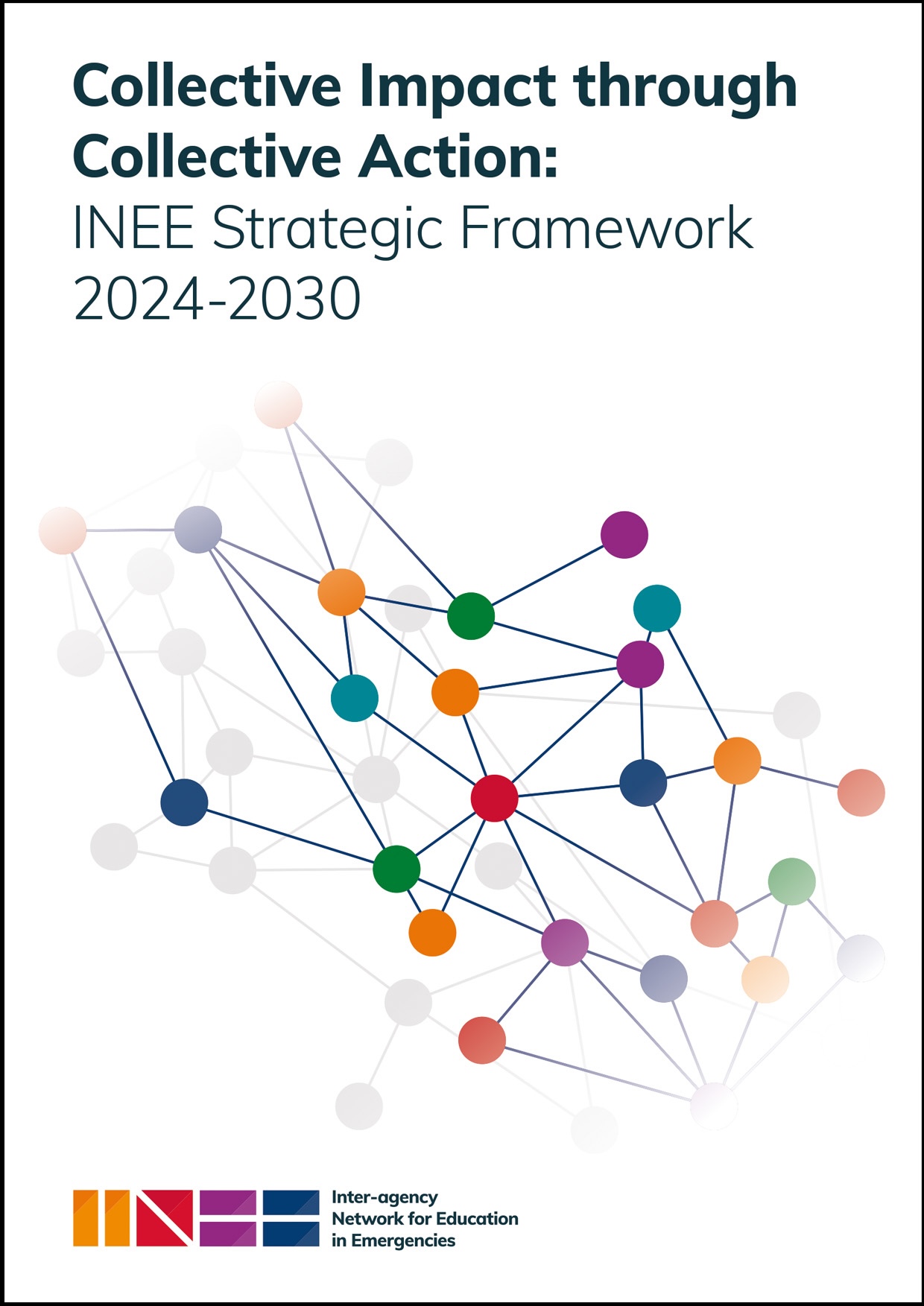About INEE
The Inter-agency Network for Education in Emergencies (INEE) is an open, global network of members working together within a humanitarian and development framework to ensure that all individuals have the right to a quality, safe, relevant, and equitable education.
INEE’s work is founded on the fundamental right to education.
Mission
To ensure the right to a quality, safe, and relevant education for all who live in emergency and crisis contexts through prevention, preparedness, response, and recovery.
Guiding Principles
The following statements represent INEE's guiding principles. Along with the INEE statement on anti-racism, they frame INEE’s work and actions. The INEE principles are aligned with the Universal Declaration of Human Rights, Humanitarian Principles, Sustainable Development Goal 4, Core Commitments for Children in Humanitarian Action, and the Global Compact on Refugees.
- Adhere to global commitments
- Focus on holistic lifelong learning, including livelihoods
- Support displaced populations
- Promote preparedness, sustainability, coordination, and system strengthening
- Support active community participation
Click to read the full text of the INEE Guiding Principles and the INEE Statement on Anti-Racism and Racial Equity
INEE Strategic Framework 2024-2030
 The INEE Strategic Framework is a multi-year strategy that serves as the guide for all of INEE’s work and results through 2030. It empowers the network to continue to play an effective role in the fulfillment of the right to quality, safe, and relevant education for all those affected by emergencies and/or protracted crises. The INEE strategic framework outlines INEE’s role and added value in the EiE sector, centers INEE’s collective action approach and the INEE Minimum Standards for Education, articulates INEE’s theory of change, and sets ambitious yet achievable outcomes for members to pursue together.
The INEE Strategic Framework is a multi-year strategy that serves as the guide for all of INEE’s work and results through 2030. It empowers the network to continue to play an effective role in the fulfillment of the right to quality, safe, and relevant education for all those affected by emergencies and/or protracted crises. The INEE strategic framework outlines INEE’s role and added value in the EiE sector, centers INEE’s collective action approach and the INEE Minimum Standards for Education, articulates INEE’s theory of change, and sets ambitious yet achievable outcomes for members to pursue together.
The ten outcomes INEE will pursue as a network are organized around five Strategic Priorities:
- Strategic Priority 1: Provide thought leadership and support global advocacy,
- Strategic Priority 2: Strengthen competencies of EiE stakeholders through capacity sharing and mutual learning,
- Strategic Priority 3: Organize, curate, and disseminate EiE knowledge,
- Strategic Priority 4: Promote the ethical production, sharing, and uptake of EiE data and evidence, and
- Strategic Priority 5: Facilitate meaningful, equitable, and inclusive engagement of INEE members in network activities and decision-making.
Core Functions
- Community Building: INEE promotes and sustains its members' values. By encouraging substantive and diverse participation, collaboration, and communication, INEE builds ties among members to promote an inclusive, mutually supportive EiE community.
- Convening: INEE brings stakeholders together to foster dialogue, advance research to build the evidence base, and support the establishment of partnerships to work toward shared solutions.
- Knowledge Management: INEE gathers, filters, organizes, synthesizes, and disseminates relevant information to strengthen individual and institutional capacities.
- Amplifying and Advocating: INEE enables the voices of its members to influence change in policy and practice, and promotes new, little-known, or poorly understood ideas.
- Facilitating and Learning: INEE promotes collective action to help members develop their capacities and carry out their activities more efficiently and effectively.
- Providing Tools and Resources: INEE mobilizes and disseminates resources, materials, and opportunities that support members' work and respond to their demands.
History
INEE was conceptualized in 2000, during the Strategy Session on Education in Emergencies of the 2000 World Education Forum, held in Dakar. As a result, UNESCO, UNICEF, and UNHCR committed to advancing Strategy Five of the Dakar Framework, and in November 2000 they convened the first Global Consultation on Education in Emergencies in Geneva. INEE was launched during that consultation to build on and consolidate existing efforts.
Vision
- All people affected by crisis and instability have access to quality, relevant, and safe education opportunities;
- Education services are integrated into all emergency interventions as an essential life-saving and life-sustaining component of humanitarian response;
- Governments and donors provide sustainable funding and develop holistic policies to ensure education preparedness, crisis prevention, mitigation, response, and recovery;
- All education programmes preparing for and responding to emergencies, chronic crises, and recovery are consistent with the INEE Minimum Standards and accountable for quality and results.
Funding and Administration
As a global inter-agency network, INEE is governed by a set of by-laws, but is not an incorporated organization and it does not have a legal identity. This status allows INEE to maintain neutrality and maximum flexibility for adapting to a changing field of work and to stakeholder priorities. INEE’s administrative oversight and fiscal sponsorship are provided by our partners, the International Rescue Committee, a non-governmental organization with 501c(3) tax-exempt status in the United States, and the Norwegian Refugee Council (NRC), a non-government organization based in Norway; these organizations also receive funds on INEE’s behalf. All funds are subject to the fiscal accountability and auditing procedures of our partners.
INEE is not a funding organization; it does not provide any form of financial disbursement, grants, contributions, scholarships, or travel funds to individuals or organizations.



